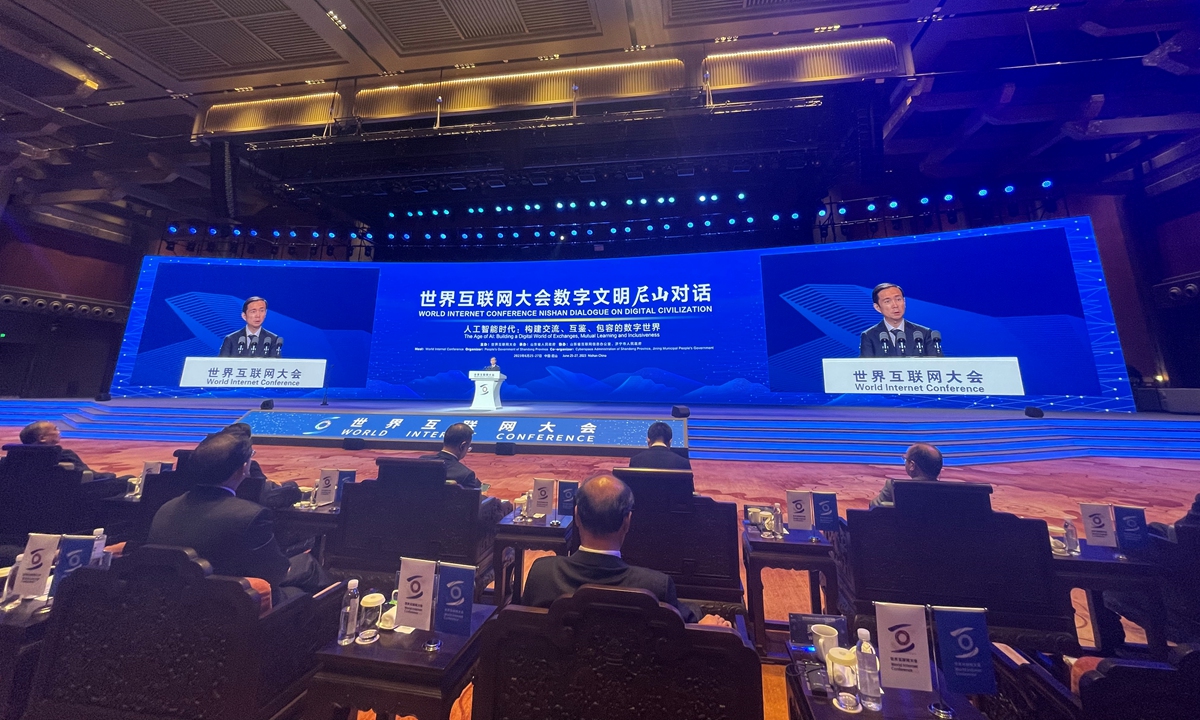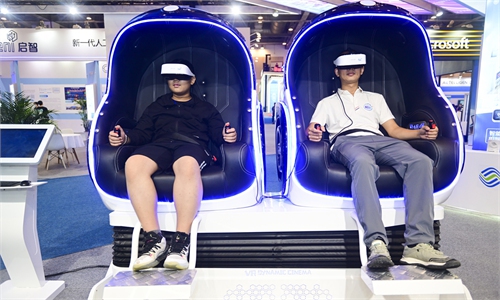Chinese internet companies, scholars gather at birthplace of Confucius to discuss how to build safe and reliable AI

Alibaba CEO and Chairman Zhang Yong addresses the World Internet Conference Nishan Dialogue in Qufu, East China's Shandong Province on June 26, 2023. Photo: Liu Caiyu/GT
The artificial intelligence (AI) is now the most active frontier of global digital technology innovation, a new track for the digital economy and a new hot spot for international competition. But how to cope with the challenges it has brought so as to build safe and reliable AI is a matter of great concern for all.
Representatives of leading internet companies including Baidu, Alibaba, 360 Security Group, scholars and government officials gathered at Nishan, the birthplace of Confucius in East China's Qufu, in an attempt to find an answer.
Artificial intelligence, like other digital technologies, is a double-edged sword. While it brings us more advanced, automated, and intelligent ways of working and living, it also poses challenges to security, Zhou Hongyi, founder of 360 Security Group, told the Global Times at the World Internet Conference Nishan Dialogue.
Whether the AI model has vulnerabilities or is easily attacked or misled, and whether the model data can be leaked or contaminated during training are all possible security challenges, not to mention its dangers when it is being used in critical fields such as finance, law and autonomous vehicles, Zhou said.
In the face of security concerns regarding the development of large-scale robots, Zhou believes that the key to achieving a safe and reliable application of AI is to position the robots as assistants to enterprises and employees or as a "co-pilot," enabling humans to play a critical role in the decision-making loop.
The AI can provide suggestions and reports, but the final decision should be made by humans, and it should not directly bypass humans or go beyond various business systems to make decisions, Zhou said.
Addressing the conference, Alibaba CEO and Chairman Zhang Yong said that AI technology should enhance the well-being of the people. No matter how powerful machines become, humans who create them should always be stronger, better, and wiser.
Every era has its own civilizational characteristics but what is the spirit of digital civilization today? Zhang said Confucianism advocates the importance of cultivating one's morality before achieving success. Correspondingly, in the development of artificial intelligence, technological progress must comply with social norms and must do more good to humanity.
Threats of AI technologies are not only technical or legal but could be social as well, as it may lack fairness or equality. Thus, managing the AI risk will be more complex and need additional means other than the normal cybersecurity risk management approach, Walter Fumy, chairperson of CEN-CENELEC JTC 13 Cybersecurity and Data Protection, told the Global Times at the conference.
Fumy said the EU is at the forefront of defining and regulating their AI but besides the European approach, there are many other frameworks available. He called for the industry to reach a common ground somewhere, not end up coming up with hundreds of different legislations in AI fields which would be redundant and overlapping.
But Gong Ke, executive director of the China New Generation Artificial Intelligence Development Strategy Academy, told the Global Times there are actually some common grounds between the EU draft law and similar regulations in China and the US. The difference lies in how each country words their regulations and puts emphasis on different aspects, Gong said, calling for sharing and exchanging different AI models of countries, such as privacy algorithm, so as to reach more common ground.
EU lawmakers recently had taken a step toward passing landmark legislation on the use of AI, the world's first comprehensive AI law, and it is expected to reach final agreements over specific regulations, media reported.
Gong said the EU law will be an important reference for other countries to regulate their AI but as countries accelerate AI development and try to figure out how to slow down the fast-developing AI, the priority should be to find a balance as regulations will directly affect the future of the development of AI industry.
"Hopefully the legislation won't create a 'special situation' for Europe," or say, the EU will have much stricter regulations than other parts of the world, Fumy told the Global Times, explaining then it would be unfortunate and certainly hinder the development of the industry, leading to some startups rather moving to other places.
For China, Zhou believes that customized GPTs will be a possible solution which enables more efficient, safe and reliable decision-making processes but also improves performance in various industries. In the future, China will not only have one large AI model, but every government department, enterprise, and even every individual will have their own "customized GPT," Zhou told the Global Times.
These customized AI models will have both the general ability to understand human knowledge and interact with humans, as well as the ability to use industry-specific knowledge and customized knowledge unique to enterprises and governments for enhanced training and fine-tuning. From this perspective, it will solve security and reliability concerns, Zhou said.
Representatives of leading internet companies at the conference are aware of the importance of AI in digital economy, hoping to make a difference in the AI race.
The Tongyi Qianwen AI chatbot developed by Alibaba has received great enthusiasm and feedback from all walks of life, especially the industry, with more than 100,000 enterprise users applying for access, covering almost all new and traditional industries, according to Zhang at the conference.
Baidu CEO Robin Li said the next frontier in the development of AI models is not only to imitate humans and complete their "prescribed actions," but also to help humans explore and discover unknown fields and break through the limits that humans have not been able to overcome in the past.




